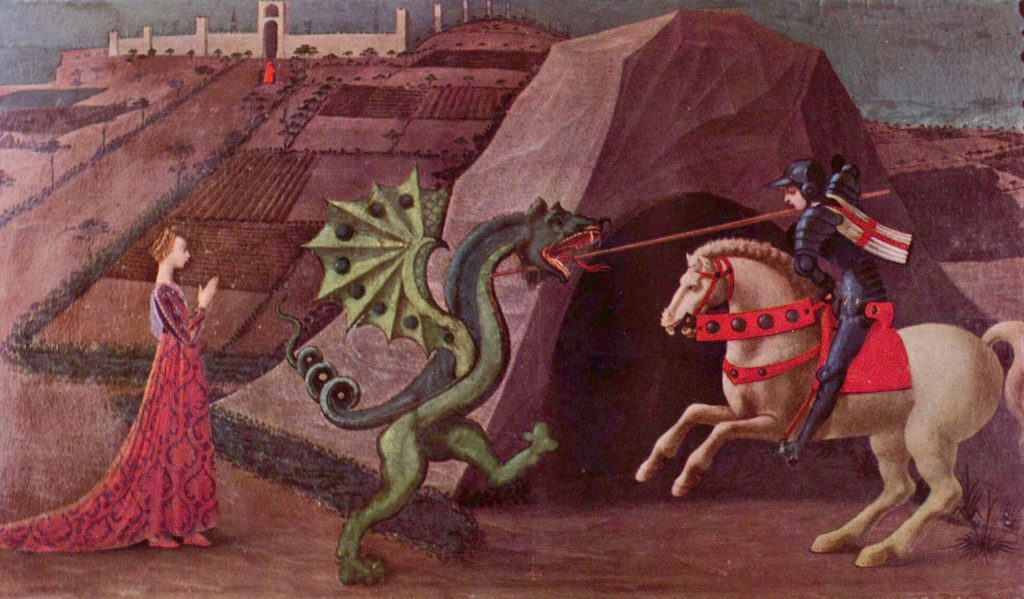The Lord of the Rings films have gotten backlash from naysayers claiming that all three films have too much walking in them. True. There is a ton of walking around Middle Earth. Yes, because things there are far away from each other, but also because that is all a part of the hero’s journey.
Think of Eragon or Richard Wagner’s Der Ring des Nibelungen—slaying the dragon is one part of that journey. The rest of the time, we are all just walking around, trying to figure things out. At a recent talk, a Priest once discussed a friend of his who is an Exorcist. Because of Hollywood, people are obsessed and fascinated by his job. Most of the time, his friend is balancing budgets and planning church maintenance; one hour a month, he goes and fights demons.
The same can be said for the many saints and martyrs of the Church. Their deaths were but one moment in a lifetime of journeying. There may have been bouts of spiritual dryness, hard trials, tests of patience or anger, or mere boredom. As Catholics, we cannot let our relationship with God be ruined by the whims of the Vatican or some irreverent people at mass.
We have all known priests who are terrible homilists. They may even be garbage at math. One such priest I knew still shoveled the driveway every time it snowed so an old lady could go to mass and pray for healing and strength in front of Our Blessed Lord in the Tabernacle. Another woman I knew had a bad hip but would walk to daily mass and offer her pain to God while saying three rosaries along the way. And guess what? It was to a guitar mass. Talk about devotion!
Young Catholics need to grow in spiritual maturity. Yes, the modern world hates us, but so did the ancient world. The solution? As always, the spiritual works of mercy. However, we should also endeavor to offer each prayer for a specific intention. No matter how short the prayer. Thirty seconds? No problem. Offer it up for your coworker who is pissed he got a bad haircut or that the weather is good next Friday when you are off. Offer it up for the barista having a bad day or the single mother on the bus barely holding it together. It may seem trivial or silly, but we don’t know what dragons others face as they journey through this life.
Generally, it is right not to sweat the small stuff. Yet, we cannot know the full effect minor problems may have in both our lives and the lives of others. Things can balloon very quickly, and then it becomes death by a thousand cuts. It can be debilitating. It could seem like everything is against you, or you might feel that no one would understand because you are essentially complaining about the banality of life.
The “Little Way” of Saint Thérèse is a simple approach to the spiritual life that seeks to do ordinary things with extraordinary love. In her autobiography Story of a Soul, Saint Thérèse describes her “Little Way,” which consisted of performing “little virtues,” not seeking grandiose sacrifices to God, but little acts of holiness.
“You make me think of a little child that is learning to stand but does not yet know how to walk. In his desire to reach the top of the stairs to find his mother, he lifts his little foot to climb the first step. It is all in vain, and at each renewed effort he falls. Well, be like that little child. Always keep lifting your foot to climb the ladder of holiness, and do not imagine that you can mount even the first step. All God asks of you is good will. From the top of the ladder He looks lovingly upon you, and soon, touched by your fruitless efforts, He will Himself come down, and, taking you in His Arms, will carry you to His Kingdom never again to leave Him. But should you cease to raise your foot, you will be left for long on the earth.”
One of my favorite prayers is the one to Our Lady of Guadalupe, which asks:
“Mother of the true God, obtain for us from thy most holy Son the grace of keeping our faith, sweet hope in the midst of the bitterness of life, burning charity and the precious gift of final perseverance.”
It can be hard to keep hope when life is so bitter. Our tribulations, no matter how big or small, should be opportunities to grow in holiness. Easier said than done, to be sure. To gain strength in our conviction, we should look to the lives of the Saints and the legacy of great Catholics who walked before us.
During the 16th and 17th centuries, the English Renaissance composer William Byrd produced sacred music for Anglican services. The Tudor authorities, suspicious of Byrd and his relationship with many prominent Catholics, persecuted and prevented Byrd from making music. To support the underground Church, Byrd composed sacred music for three voices so masses could be sung clandestinely in someone’s house.
He fought back, but Byrd’s story did not end there. Byrd found a way to glorify God despite all the adversity and oppression he faced. Byrd later converted to Catholicism and was eventually allowed to contribute music to the repertory of Anglican church music.
Life can be tedious, unfair, horrible, and filled with regrets. Regardless, if we find little ways to glorify God daily, we open ourselves to God’s grace. If we can do that, we will keep sweet hope in this life. Seeing beauty along the walk through Middle Earth will become easier. It is never too late to see it.
To read more from Josef Luciano or to contact him directly, please visit www.josefluciano.com.



One Response
Joey, you are wise beyond your years. It took me time to come to the conclusions that you have expressed so beautifully in this piece. I have read your article twice and it has reinforced my goal to be a better person and a better Catholic. I love my Catholic Faith, and I love you. Hope to see you soon.
Aunt Pudgie